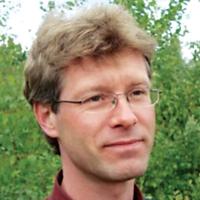This project seeks to systematically catalog and analyze features of macroevolution in the human lineage that increase autonomy from the external environment and impart directionality to evolutionary trajectories. In particular, they will analyze how changes in the mutual relations of autonomy, constraint, and agency open up new evolutionary spaces of possibility. A key output of this work will be a better theoretical understanding of the historical interaction among causal factors surrounding agency that contribute to macroevolutionary directionality and augment our understanding of evolutionary processes, especially with respect to the origin of modern humans.

Bernd Rosslenbroich
Evolutionary Origins and Transitions of Agency
Features of autonomy in human evolution
Subaward Principal Investigator
Witten/Herdecke University
Bernd Rosslenbroich is an evolutionary biologist at Witten/Herdecke University, Germany. His general interests are patterns and processes in macroevolution, systems biology, and philosophy of biology and medicine. The approach of his team is to analyze morphological and physiological patterns and trends and then to learn about underlying processes. He is especially interested in organismic concepts of biology which take due account of the specific characteristics of the organism. Further he is interested in general zoology and watching nature (including birding) in field trips and on journeys for example to Northern Europe, Africa and Malaysia.
Books:
Rosslenbroich B (2014): On the Origin of Autonomy. A New Look at the Major Transitions in Evolution. Springer Cham, Heidelberg, New York, Dordrecht, London
Rosslenbroich B: Properties of Life – Towards a Theory of Organismic Biology (book manuscript, currently under review)

Benjamin Bembé
Evolutionary Origins and Transitions of Agency
Features of autonomy in human evolution
University Witten/Herdecke
Benjamin Bembé was born in 1972 in Munich, Germany. He studied biology and geography in Munich. His doctoral thesis he wrote 2000-2004 on the Zoological State Collection Munich on Orchid Bees of South America. From 2002-2018 he worked as an highschool teacher in the subjects of biology and geography. Since 2018 he is working as a researcher in the Institute of Evolutionary Biology and Morphology, Witten/Herdecke University. Special interests are the systematics and organization of insects, features of human evolution and cultural products, and issues of didactics in biology teaching. Numerous trips took him to countries in South and Central America, to Namibia, Borneo and to Egypt.

Susanna Kümmell
Evolutionary Origins and Transitions of Agency
Features of autonomy in human evolution
University Witten/Herdecke
Susanna Kümmell, a paleontologist at the Institute of Evolutionary Biology (University Witten/Herdecke, Germany), studied geology/paleontology and Waldorf education and is working about the evolution of synapsids from the Permian to the End of the Cretaceous. A special focus are the evolution of synapsid manus and pes, anatomical trends and the animal's locomotion. This approach is taken as a basis to study evolutionary patterns of heterochrony, probable processes of plasticity and trends in autonomy during the Permian and Mesozoic.
